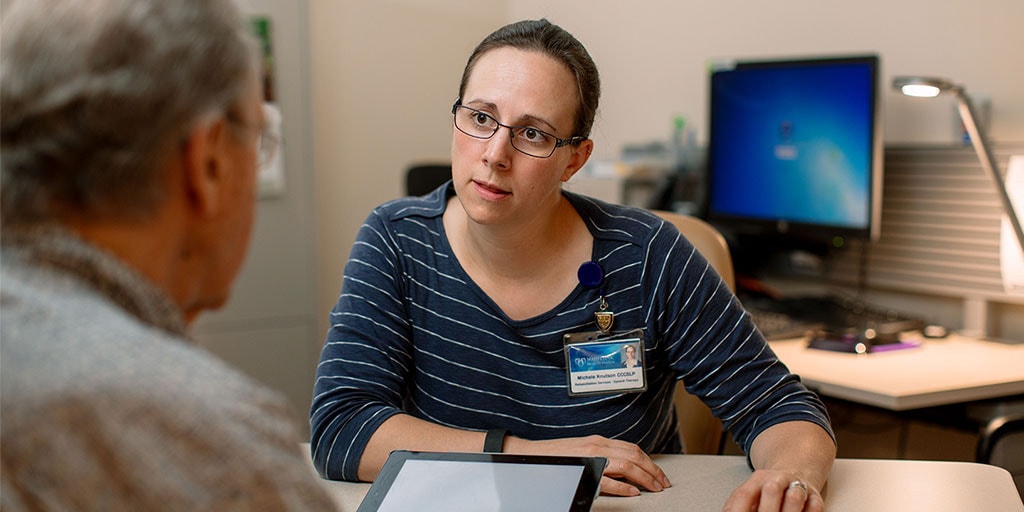Find the Best Speech Pathologist Near You for Effective Treatment
Find the Best Speech Pathologist Near You for Effective Treatment
Blog Article
How a Speech Pathologist Can Aid Improve Communication Skills
Effective communication is a keystone of personal and professional success, yet several people deal with obstacles that hinder their capacity to share themselves clearly. A speech pathologist is geared up to address these obstacles via targeted analysis and treatment methods customized to each individual's requirements. By utilizing evidence-based restorative methods, they not only function to boost speech and language problems but likewise enhance total communicative skills. Comprehending the complex role of a speech pathologist discloses just how their expertise can transform lives, inviting a better evaluation of the specific techniques and results connected with their practice.
Understanding Communication Disorders
Recognizing interaction disorders is important for identifying how they affect people' capacity to reveal themselves and involve with others. Communication disorders incorporate a vast range of problems that affect speech, language, and social interaction, commonly preventing effective communication. These disorders can arise from different aspects, consisting of neurological problems, developing hold-ups, physical impairments, or emotional problems.
Speech disorders might show up as problems in fluency, voice, or articulation manufacturing, influencing exactly how words are noticable or talked. Language conditions, on the other hand, entail obstacles in understanding or utilizing language, which can restrain both verbal and non-verbal communication. Social communication conditions are identified by troubles in the practical elements of communication, such as taking turns in discussion or understanding social hints.
The consequences of interaction disorders are profound, influencing not just the person's capacity to convey ideas and emotions yet also their social relationships, educational chances, and overall quality of life. Understanding of these conditions can promote compassion and support, motivating effective techniques for interaction and interaction. Understanding the complexities of interaction conditions is a crucial action in the direction of promoting inclusivity and dealing with the requirements of those affected.
Duty of a Speech Pathologist
Speech pathologists frequently play an important function in treating and identifying interaction problems, utilizing a variety of evidence-based strategies customized to every individual's requirements. These professionals function with people throughout the lifespan, from kids with speech hold-ups to adults recouping from strokes or distressing mind injuries. Their know-how encompasses a variety of communication issues, including articulation, language, voice, and fluency problems.
In healing settings, speech pathologists make use of structured interventions developed to enhance communication abilities. They may implement techniques such as speech exercises, language video games, and social interaction training to facilitate improvements in receptive and meaningful language capabilities. Speech Pathologist. In addition, they inform customers and their families concerning effective communication techniques and adaptive approaches to navigate everyday communications
Beyond straight treatment, speech pathologists team up with various other healthcare caretakers, instructors, and professionals to make sure an extensive technique to treatment. They support for customers by offering resources and assistance, making it possible for people to achieve their interaction objectives and enhance their overall lifestyle. As experts in the field, speech pathologists are essential in fostering efficient communication, advertising independence, and improving social engagement for those with interaction obstacles.
Assessment and Diagnosis Refine
The evaluation and medical diagnosis procedure conducted by speech pathologists usually involves a detailed evaluation to determine interaction problems properly. This procedure begins with a comprehensive case background, where the clinician gathers relevant details about the person's clinical, educational, and developmental background. Comprehending the context of the individual's communication difficulties is vital for an accurate diagnosis.
Complying with the medical history, speech pathologists utilize standard tests and informal evaluations to evaluate various elements of communication, including speech audio production, language comprehension, meaningful language, and social communication abilities. These evaluations are customized to the person's age and details problems, providing important information for evaluation.
Monitoring is likewise a vital component of the assessment process, as it allows the medical professional to see firsthand how the individual communicates in all-natural settings. In addition, interviews with relative and educators can offer insight into the individual's interaction obstacles across different settings.
As soon as the evaluation is complete, the speech pathologist synthesizes the findings to establish a medical diagnosis and recommend ideal interventions. This detailed evaluation process ensures that individuals receive targeted support tailored to their unique interaction needs, laying the structure for effective restorative strategies.
Healing Methods and Approaches
Countless healing techniques and strategies are utilized by speech pathologists to deal with a range of interaction disorders successfully. One widely utilized technique is expression treatment, which concentrates on correcting speech appears via repeating and visual signs. This strategy is especially useful for individuals with speech sound problems.
Another reliable method is language intervention, which improves both expressive and responsive language skills. This may include interactive tasks that promote vocabulary development, syntax understanding, and conversational abilities. Additionally, speech pathologists often use social skills training to boost pragmatic language abilities, enabling individuals to navigate social interactions a lot more effectively.
Fluency shaping and stuttering adjustment techniques are especially made to help those experiencing fluency problems. These strategies help clients establish smoother speech patterns and handle the physical and emotional components of stuttering.
Furthermore, augmentative and alternative communication (AAC) systems are used for people with serious communication disabilities. These systems, which can consist of gestures, signs, or digital devices, offer i loved this important assistance for effective communication.
Benefits of Speech Therapy

In addition, speech therapy can aid in establishing important listening and comprehension skills, promoting much better communication in conversations. People with cognitive-communication problems can also click here to find out more profit, as therapy focuses on enhancing memory and analytical abilities, essential for effective communication.
Another essential element is the emotional assistance given during treatment sessions. Speech pathologists develop a secure environment, motivating patients to get over stress and anxiety and disappointment relevant to their interaction problems. This assistance can result in enhanced self-worth and general mental wellness.
Moreover, very early treatment through speech therapy can prevent additional issues, ensuring that individuals reach their full communicative potential. Generally, the advantages of speech treatment extend beyond mere speech improvement, favorably impacting various dimensions of life for those impacted by communication troubles.
Conclusion
In recap, speech pathologists play a vital role in addressing interaction problems through assessment, diagnosis, and tailored restorative treatments. By utilizing evidence-based strategies, these experts improve individuals' speech and language capabilities, cultivating improved clearness, fluency, and social interaction skills. The advantages of very early intervention emphasize the value of looking for assistance from speech pathologists, as their expertise can substantially improve communicative possibility, inevitably resulting in greater success in both individual and professional spheres.

Speech pathologists frequently play an important function in dealing with and identifying interaction conditions, employing an array of evidence-based techniques tailored to each individual's requirements. As experts in the field, speech pathologists are crucial in promoting effective interaction, promoting freedom, and enhancing social involvement for those with interaction obstacles.

Report this page